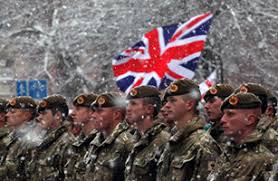British Army To Allow Uniformed Soldiers To March In Gay Parade
Latest Step Toward Full Equality for Gays in Britain
SANTA BARBARA, CA, – The British Ministry of Defense has announced that the Army will allow its soldiers to participate in London’s Gay Pride parade on July 5 in uniform. The move ends a ban on British Army personnel wearing their uniforms in the parade, and brings the Army into line with the Royal Navy and Royal Air Force, which both allow service members to march in uniform. Britain lifted its longstanding ban on gays in the military in 2000 after a European court decision on the matter.
Aaron Belkin, director of the Palm Center at University of California, Santa Barbara, said the change shows how seamless the transition to equal treatment can be once initial concerns are overcome. “Our research shows that politics and fear are the major sources of resistance to ending discrimination in the military,” said Belkin, also a political science professor at the university. “Opponents of equal treatment predicted all kinds of doomsday scenarios when Britain lifted its ban, and some residual opposition to full-scale equality accounts for the Army’s sluggishness in full implementation. In a very short time, the clear success of openly gay service has shown naysayers that there is nothing to fear and that equality helps strengthen the armed forces.”
Twenty-four nations now let gays serve openly in the military. The Palm Center, a think tank that studies gay service, released several studies on the experiences of foreign nations that lifted their gay bans, and on the relevance of those experiences to the U.S. The Palm studies, along with numerous internal reports by those nations’ militaries and by other independent government and academic studies, have uniformly found that openly gay service does not harm military readiness, and that the transition to a policy of equal treatment is most effective when supported by top leaders in the institution.
Palm Center senior research fellow, Nathaniel Frank, will publish a book on gays in the military in early 2009 that chronicles the detailed history of several nations whose militaries ended discrimination on the basis of sexual orientation. In the book, “Unfriendly Fire: How the Gay Ban Undermines the Military and Weakens America” (St. Martin’s Press), Frank assesses a wealth of research on foreign militaries and American analogous institutions, including the Palm studies. He concludes that, “despite fears that gays could turn fighting forces into gay pride floats, the majority of gays serving in foreign militaries and American police and fire departments conform to expected norms of their organization.”
